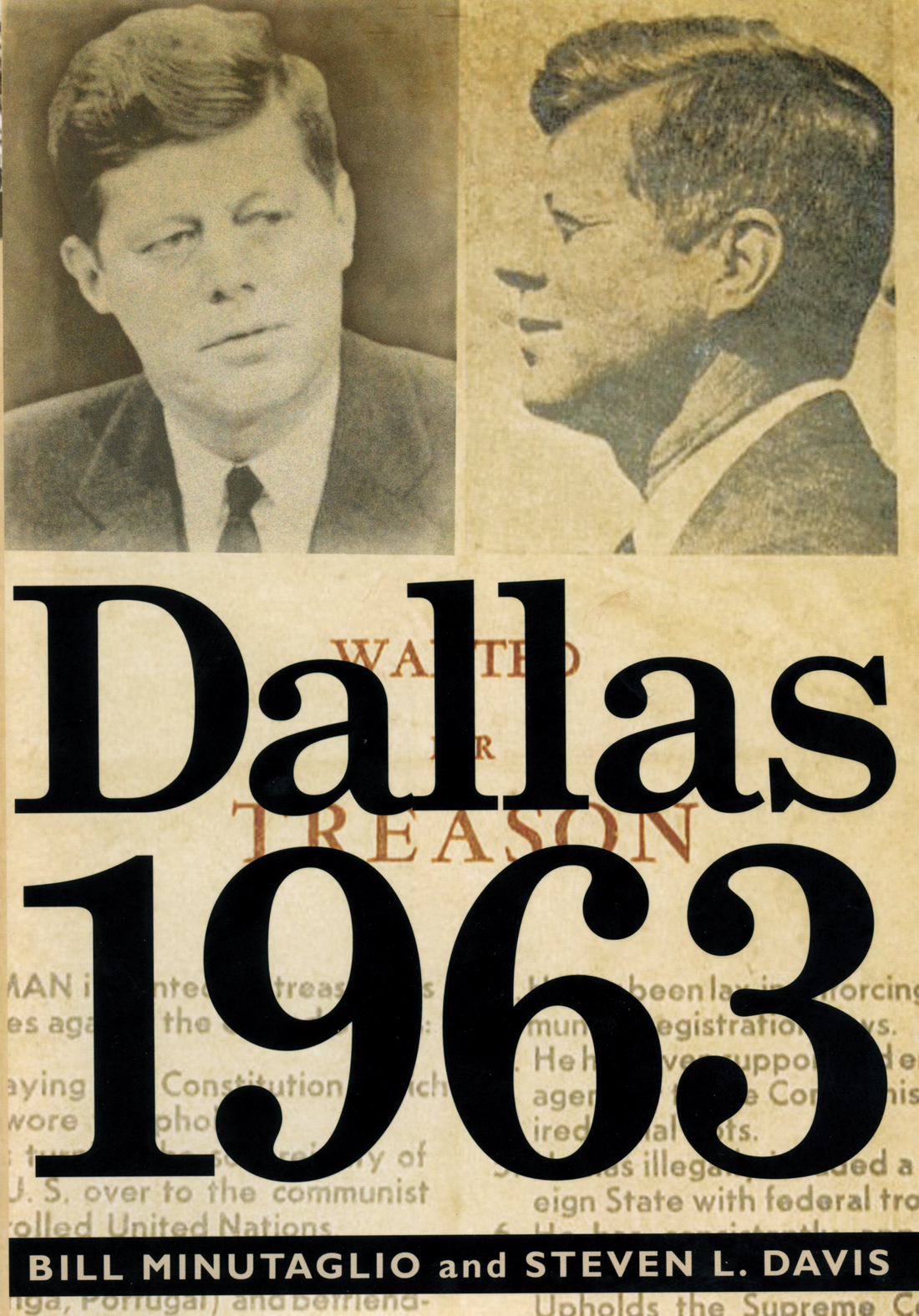This is not a book about the assassination of President John F. Kennedy. In fact that event and its aftermath are detailed only in the epilogue. Instead, Dallas 1963 is a fascinating study of the political climate in the city in the years leading up to the tragedy.
From the point of view of the city’s ultra-conservative majority, it was the worst of times, and it was pretty awful for minorities and poor people, too.
The rich and powerful men of Dallas — with a singular exception — were losing their grip on the principle that had guided them from the city’s beginnings. That principle was “whatever’s good for business.” They saw blended threats of Communism, socialism, racial equality, and foreign appeasement shaking their foundations. And that, in turn, had led to a climate of hatred and fear.
Who were these men?
As with any good thriller, this story by Bill Minutaglio and Steven L. Davis is character-driven.
Bruce Alger, a Republican congressman, had never passed a single piece of legislation, and yet he was the city’s golden boy, rising to rebuke the United Nations and casting the lone vote in the U.S. House against giving surplus milk to underprivileged elementary school children.
Ted Dealey, publisher of The Dallas Morning News, cheered Alger on while warning against changes to the status quo (meaning integration).
Oilman H.L. Hunt was the richest guy in town. To call him eccentric is like saying that Stephen Hawking is pretty smart. Hunt was a shameless self-promoter and believed himself to be one of the world’s best thinkers and writers. Although his original radio programs, books, and jingles were tawdry and amateurish, they conveyed his messages. In short, he believed the wealthy should have more votes than the poor, and he was vehemently against the U.N., Social Security, and the U.S. Supreme Court.
W.A. Criswell, pastor of the city’s largest Baptist church, preached against Kennedy, Catholicism in general, and racial integration. Hunt was a prized member of his congregation.
So when Gen. Edwin A. Walker, who had distributed John Birch Society materials to his troops in Germany and had accused former President Harry Truman of being “definitely pink,” was ousted from the U.S. Army, there was only one place he could see to set up his headquarters: Dallas. He figured he’d be appreciated there, and he was right.
Violence against anyone who didn’t share the views of these men was commonplace — even when those people were equally powerful. Lyndon Baines Johnson, then majority leader of the U.S. Senate, and his wife Lady Bird were physically assaulted and spat upon when they visited Dallas in late 1960.
U.S. Ambassador to the U.N. Adlai Stevenson was heckled and assaulted as he attempted to deliver a speech in October 1963. Abandoning the stage, he remarked, “Are these human beings or animals?”
It should be noted that the assailants in both cases were largely women. The so-called Mink Coat Mob who attacked the Johnsons did so out of loyalty to Alger. The woman who hit Stevenson with a sign and blamed it on being “pushed from behind by a Negro” was a supporter of Walker. Her claim was proved false by news footage.
The paranoia of the power structure reached a new high with Kennedy’s campaign for the presidency. Surely, as a Catholic, he’d bow to the Pope, and the United States would fall victim to its enemies. Surely he’d usher in socialism and deprive the Dallas elite of their profits from oil. When the candidate triumphed, many simply refused to acknowledge the election results.
Only three heroes emerge: two African-American activists and a multimillionaire. Juanita Craft and the Rev. Rhett James risked their lives every day working for freedom and equality in a city where black men regularly “disappeared.”
And the multimillionaire? Stanley Marcus, whose store was the favorite of both old money and the newly rich, tried to show reason and tolerance. Marcus was a worldly sophisticate and a Jew. Those two attributes kept him out of many clubs and closed-door meetings. (Of course, no one could dispute that Neiman Marcus was good for business.)
Minutaglio, a veteran newsman and author, and Davis, author of two highly praised books about Texas and now a curator at the Wittliff Collections at Texas State University, turn this material into a fast-paced page-turner. The seams never show in their story, despite the research and fact-finding that underlie it.
Dallas 1963 is a scary book. It’s hard to believe that such things actually happened.
I was there, working at my first grown-up job: for H.L. Hunt’s oil company. I wasn’t registered to vote and never read the newspaper, but even I could tell that anyone with any seniority at Hunt Oil hated Kennedy.
Mr. Hunt kept his employees on a tight leash, but he let us leave our workplace in the Mercantile Building and go down to Main Street to watch the motorcade go by. It was a pretty day. We stood so close to the President and Mrs. Kennedy that we could have almost reached out and touched them.
By the time we’d returned to our offices, the phones were ringing with the awful news.













Thank you for covering a part of the story most local media is ignoring. I agree with Ms. Allyson that “It’s hard to believe that such things actually happened.” Even harder to believe the atmosphere of hate is happening again today.
It really amazes me that writers and commentators -always of a certain ilk- (otherwise, I suppose they would not get a job or get published), liberal “pundits” etc see no parallel between the intolerance of the past and vicious, mindless, crude, on going hate campaigns against harmless and defenseless public figures such as Sarah Palin. Now i ask you, what has she ever done to anyone except exercise her right to run for office? We are clearly urged to openly mistrust and dislike each other . Who is doing the dividing now? What is their goal?
I disagree with Mr. Cook above. The Dallas Observer’s long and tedious one sided “Dallas, City of Hate” covered all of this territory in the usual manner. Salaried “Opinionists” in both major dailies here also “reminded ” us of the same-(although many were not even alive at the time- and persons of a certain age are usually found to be ignorant of historical accuracy). Silence is golden to the dominant media when there are nation wide broadcast prescriptions for torture of innocent defensless women or we are urged to envision “tearing Dick Cheneys’ heart out and stomping on it”. These “journalists” are still employed by the major media corporations at multimillion dollar salaries-btw. Who are the professional haters now? The only difference is now the haters are on a large payroll, with pensions and perks.
Ms. Palin is harmless, defenseless, innocent? Her running-buddy John McCain has described this Repuglican ‘person of a certain ilk’ as hammer-headed, dishonest, dissembling, dumb as a stump, and an unfortunate error. Surely we can agree that Mr. McCain is both trustworthy, has good judgement, and certainly would not be blowing smoke about Ms. Palin. McCain knows her better than you and I combined. You suggest Ms. Palin is an ‘innocent defenseless woman’. What are you smoking? What do you eat? Palin is an avaricious loser who flys around in high dollar,four-seat aircraft blasting timber wolfs to kingdom-come with $1800 telescoptic rifles on TV. She and the other Baggers that shut this splendid country down are childish Peckerwoods…shiftless, misguided monkeys. God help us. Get a life.